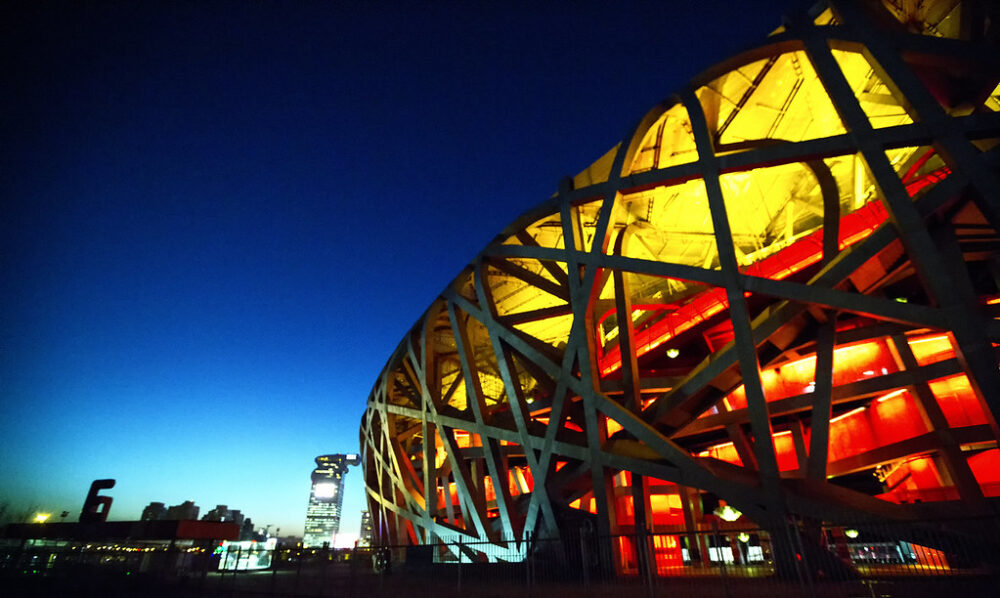
By Reese Meister
The 2022 Winter Olympic Games in Beijing, China will look unlike any in the past, given the necessity of COVID-19 restrictions and President Biden’s decision to withhold US government officials from attending the event, despite the dispute it may cause.
The opening ceremony will occur at Beijing National Stadium on Feb. 4 and the closing ceremony on Feb. 20. Later, the Paralympics will take place from March 4-13. Beijing last hosted the Olympics during the summer of 2008, now becoming the first city to host both the summer and winter games. In Beijing, participants of the Olympics are expected to follow the set COVID-19 protocol. Meanwhile, the Games face further change with Biden’s and other world leaders’ boycott in response to the host country’s violations of human rights.
China plans to organize the events into three different location zones: central Beijing, Yanqing and Zhangjiakou. They have scheduled the opening and closing ceremonies, ice events and snowboard and freestyle skiing big air events to take place in central Beijing. Meanwhile, alpine skiing, bobsleigh, skeleton and luge will be located in the suburban area of Yanqing, and Zhangjiakou will host the remaining snow events.
Athletes have the opportunity to compete in 109 events from seven different sports: biathlon, bobsledding, curling, ice hockey, luge, skating and skiing. For the first time since the 2014 Sochi Games, National Hockey League players may compete. These games will also bring the advent of several events such as women’s monobob and team speed skating events. Close to 80 US athletes plan to compete, including the youngest Olympic gold medalist on the halfpipe, Chloe Kim, and John Schuster, a participant in every Winter Olympics since 2006.
However, in order to attend, athletes, staff and journalists must meet certain COVID-19 restrictions. In an Executive Board meeting on Sept. 29, 2021, the International Olympic Committee (IOC) confirmed a requirement for unvaccinated individuals, with certain exceptions, to undergo a three-week quarantine in a confined space such as a hotel room before entering a “closed-loop system.” Those with an approved vaccination status will immediately enter the system on Jan. 23.
The US Olympic and Paralympic Committee, however, has made vaccination mandatory for every American attendee. Those who do not submit proof of a complete Food and Drug Administration approved vaccination by Dec. 1, 2021 cannot attend the Olympic or Paralympic Games and will be taken off of Team USA’s roster. Exceptions to this policy include religious and medical interferences. While this decision has met opposition from a handful of athletes, going against their political beliefs, many others have recognized the importance of the mandate for safety precautions.
The closed-loop system aims to separate China’s citizens from foreign visitors by restricting travel and providing forms of transportation. It incorporates plans for ceremonies, catering, transportation, sporting events and accomodations. Athletes will stay in either the Olympic Village or designated Beijing 2022-contracted hotels and will only travel by specific Olympics vehicles.
Like at the 2020 Tokyo Games, the IOC will enforce daily PCR COVID-19 testing for every person involved in the Olympics. Dissimilar to Japan, though, citizens of mainland China may attend events as spectators. Only mainland Chinese spectators and Olympic stakeholders may view the competitions in person in order to increase safety during this global event; no foreign spectators will be allowed.
The Omicron variant of COVID-19 poses another health concern for the IOC, but they have not changed protocol so far. The IOC has carefully created safety precautions and expects the Olympics to take place as planned. While other international events may be postponed due to Omicron and new travel restrictions, China is not likely to back down from hosting after their nearby competition and source of comparison, Japan, has shown that the games can be effectively conducted during the pandemic.
Omicron is not the only recent matter to become involved in the Olympics; President Biden became the first to declare a “diplomatic boycott” of the Olympic and Paralympic Games the week of Dec. 6. The US diplomats and officials who usually attend the Olympics will not travel to Beijing in order to protest the Chinese government’s violations of human rights, among other issues. Through a diplomatic boycott, as opposed to a full boycott, Biden avoided depriving athletes of their experience.
The most recent full boycott by the US took place under President Jimmy Carter at the 1980 Moscow Olympic Games in response to the Soviet Union invading Afghanistan. The Soviet Union then boycotted the 1984 Los Angeles Games. Today, both US Democrats and Republicans have agreed with Biden’s decision, while some push for a full boycott, arguing that withdrawing the delegation will not have the intended effect.
New Zealand, Australia, the United Kingdom, Canada and more countries have followed Biden’s lead in announcing a diplomatic boycott. China, meanwhile, claimed that it will take “resolute countermeasures” against the boycott and accused the US of “politicizing sports.”
The IOC wrote in a Dec. 6 statement that they “respect” the boycott because it does not interfere with the sports and still hopes to promote peace through the Games. Traditionally, the IOC encourages countries to place politics aside during a period of Olympic Truce that starts a week before the Olympics and ends the week after the Paralympics.
Among the many topics under dispute, boycotting countries have expressed particular concern over the targeting of social minorities, the limitations on the freedom of Hong Kong residents and China’s aggression toward Taiwan and its neighbors.
Uyghur, Kazakh and Uzbek Muslims, especially in Xinjiang, have been victims of genocide and torture in re-education centers that together hold over two million people. The Chinese government has separated about 80% of Tibetan children from their families to enforce uniformity, and several activists and protesters have disappeared. Additionally, the National Security Bill now restricts the rights of Hong Kong’s people to protest.





